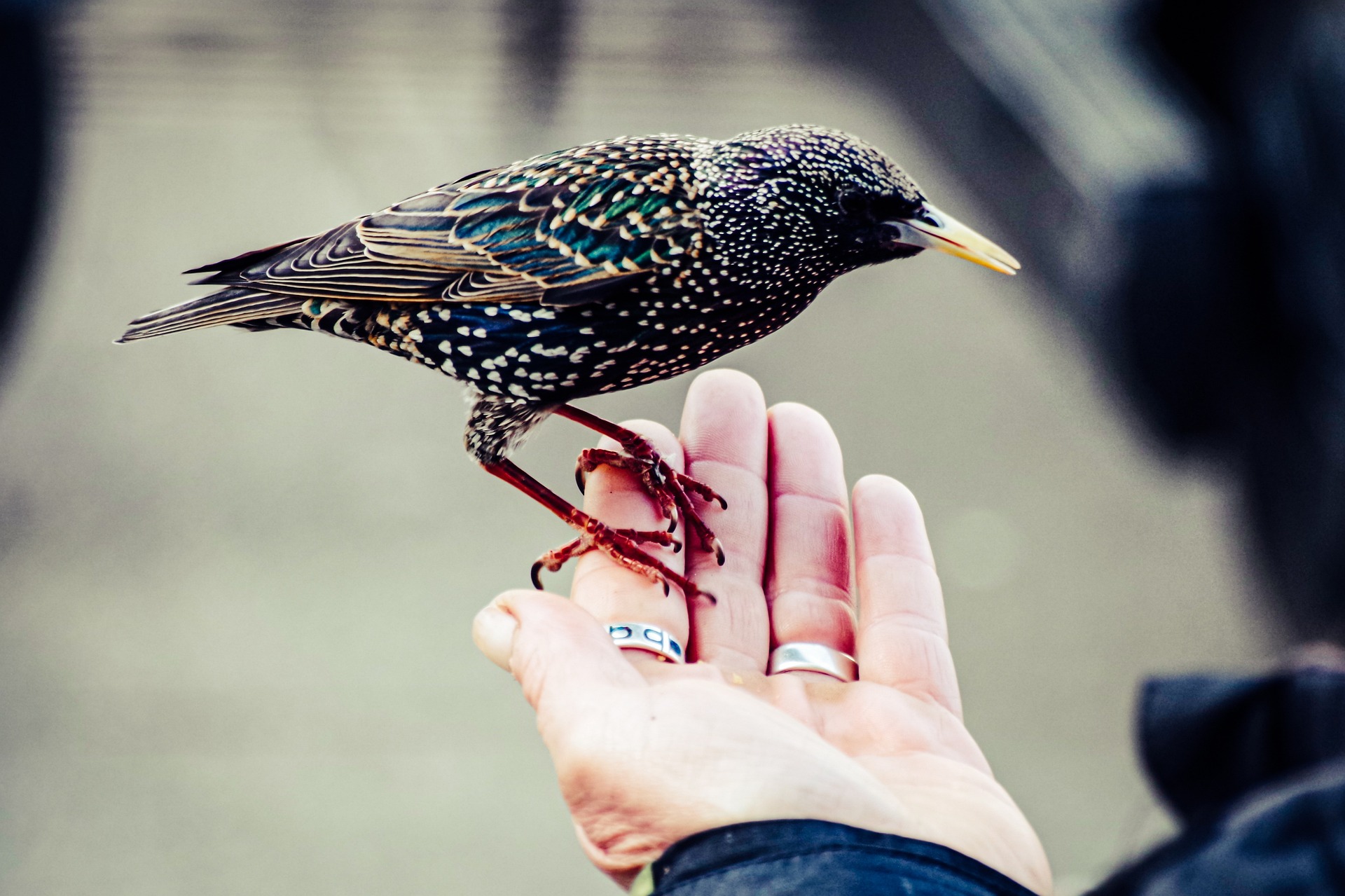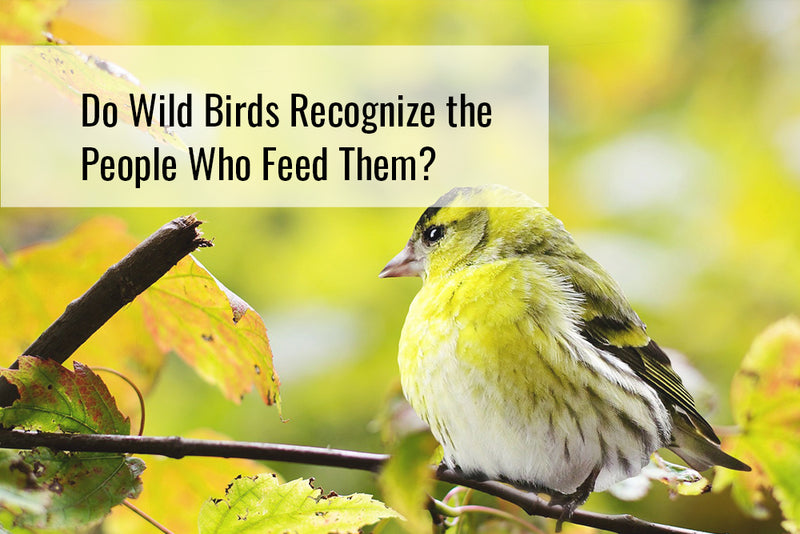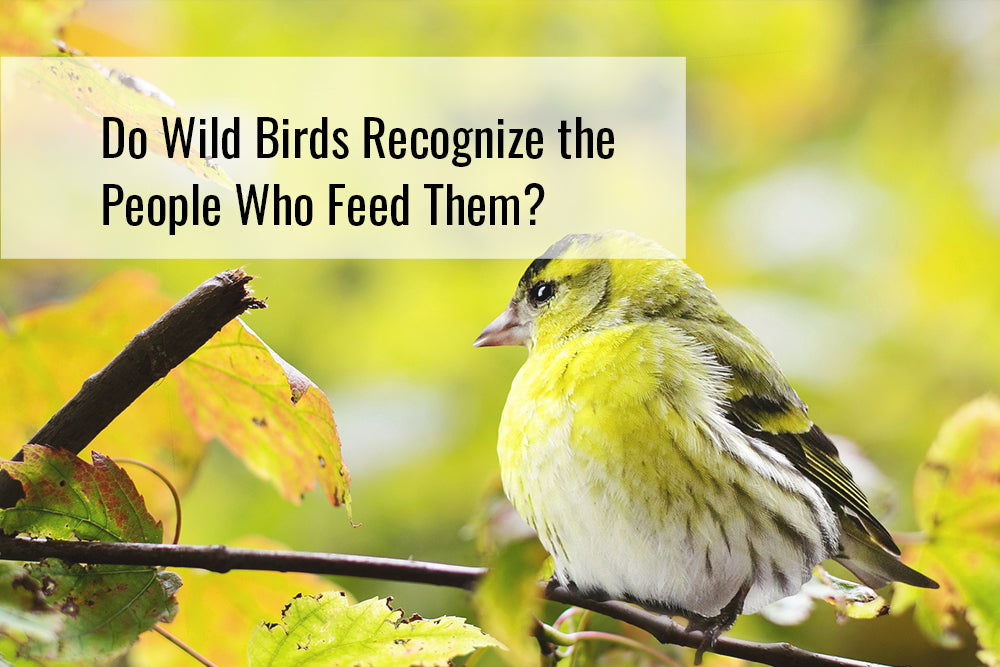Have you ever noticed how some birds seem to flock around as soon as you step outside with a handful of seeds? It’s almost as if they recognize you.
But is that truly the case? Do birds actually remember and recognize the humans who feed them? This question stirs the curiosity of many bird enthusiasts and nature lovers, like you. Understanding this connection could change the way you view your backyard visitors and enhance your birdwatching experience.
You might be surprised by what science reveals about these feathered friends and their impressive capabilities. Dive into the fascinating world of avian intelligence and discover whether the birds in your garden are more familiar with you than you might think. Keep reading to uncover the hidden secrets of your winged neighbors.

Bird Intelligence And Memory
Birds show impressive intelligence and memory skills, often recognizing humans who regularly feed them. Studies suggest that some species can differentiate between familiar faces, associating them with food. This behavior highlights their ability to remember and identify reliable sources for sustenance.
Bird Intelligence and Memory Birds often amaze us with their intelligence and memory, challenging the common perception that they have “bird brains.” Many species exhibit complex behaviors that suggest a level of cognitive ability similar to mammals. From using tools to solving puzzles, birds demonstrate remarkable intelligence that has evolved over millions of years.Understanding Bird Brains
Birds have compact yet highly efficient brains. Studies show that some bird species have a higher number of neurons in their brains compared to mammals of a similar size. This dense neural architecture allows them to process information swiftly and effectively.Memory Capabilities Of Birds
Birds have impressive memory skills. Consider how migratory birds travel thousands of miles, returning to the same breeding grounds each year. This requires a detailed memory map of their journey, highlighting their ability to remember complex routes and landmarks.Examples Of Bird Intelligence
Crows and ravens are often cited as the most intelligent birds. They can solve complex problems, such as opening locks or retrieving food from hard-to-reach places. Have you ever watched a crow use a stick to fish out insects from a tree bark? This tool use is a testament to their problem-solving skills.Do Birds Remember Human Faces?
Birds can recognize human faces, especially those of people who feed them. If you’ve ever fed a neighborhood bird, you might have noticed it approaching you more frequently. This recognition suggests they associate your face with a source of food, reflecting their ability to remember and identify individuals.Practical Implications For Birdwatchers
For bird enthusiasts, knowing that birds can recognize humans offers a unique opportunity to build trust. Try maintaining a consistent presence and offer food regularly. You might be surprised to find certain birds waiting for you or even following you around.Questions To Consider
Have you ever noticed a bird acting differently around you? Could it be recognizing you as a friendly face? Observing these behaviors might change how you interact with the avian world. Birds’ intelligence and memory capabilities continue to surprise researchers and enthusiasts alike. By paying attention to their behaviors, you can deepen your understanding and appreciation of these fascinating creatures.Bird-human Interaction
Birds and humans share a unique bond. This connection often flourishes through feeding. Many wonder if birds recognize their human benefactors. Observations suggest this interaction is more than simple feeding. Birds seem to remember the people who feed them regularly. This recognition can lead to fascinating behavioral changes.
Birds’ Memory And Recognition
Birds possess impressive memory skills. Some species can remember human faces. Studies show birds returning to feeders, often greeting familiar humans. This indicates a level of recognition. They can distinguish between regular feeders and strangers. Such memory aids their survival and helps them find food sources.
Communication And Trust Building
Feeding fosters communication. Birds may chirp or sing when they see familiar humans. This behavior shows trust and comfort. Regular feeding can build a bond. Birds often show less fear around known faces. They might approach feeders closely, seeking food. This interaction enhances their trust in humans.
Behavioral Changes In Birds
Birds exhibit noticeable changes when they recognize humans. Increased boldness is common. They approach feeders more confidently. This behavior reflects their comfort level. Birds might linger longer, observing their human friends. Some may even follow familiar feeders around. These changes signify their adaptation to human presence.
Impact On Feeding Patterns
Recognition influences birds’ feeding habits. They might visit specific locations more often. Birds learn where food is regularly provided. This knowledge directs their feeding patterns. Familiarity with humans can lead to predictable schedules. They might appear at feeding spots at the same time daily.
Signs Of Recognition
Birds may recognize humans who regularly feed them. They often show trust by approaching without fear. Over time, these birds might remember familiar faces and respond positively, expecting food.
Birds are fascinating creatures, and many people who enjoy feeding them often wonder if these feathered friends recognize the humans who provide their meals. Understanding the signs of recognition can deepen our connection with nature and offer valuable insights into bird behavior.Behavioral Cues
Birds can exhibit various behaviors that suggest they recognize you. If you notice birds approaching you more frequently or showing less fear, it might be because they associate you with food. Some birds may even follow you around your garden or backyard. This behavior indicates a level of comfort and trust. Have you ever had a bird chirp or sing while you’re nearby? This could be their way of acknowledging your presence.Feeding Habits
Changes in feeding habits can also signal recognition. Birds might gather around your feeding station at specific times if they know your routine. You might observe that certain birds only visit when you’re around, skipping the feeder when others try to fill your shoes. Sometimes, birds may even wait patiently for you to replenish their food supply, signaling their trust and recognition. Think about your experiences with birds. Have you noticed them behaving differently towards you compared to others? This could be more than just coincidence. Understanding these signs can enhance your birdwatching experience. Pay attention to these cues, and you might find a new feathered friend on your next outdoor adventure.
Species Known For Recognition
Birds have unique ways of interacting with humans. Certain species stand out for their ability to recognize people. This section explores those birds. Discover which birds remember your face.
Crows And Ravens
Crows are intelligent birds. They can remember human faces. Studies show crows recognize people who feed them. Ravens are similar in this ability. They use memory to identify friendly humans. These birds often return to the same feeders.
Parrots And Parakeets
Parrots have remarkable memory skills. They can recall human faces and voices. Parakeets also show similar recognition abilities. These birds enjoy interaction with familiar people. Feeding them regularly helps build a bond. A bond they won’t forget.
Pigeons And Doves
Pigeons are known for their homing instincts. They can recognize faces of people who feed them. Doves are gentle and observant. They often remember regular feeders. These birds appreciate routine and familiarity. Feeding them creates trust and recognition.
Scientific Studies And Findings
Scientific research on bird behavior has gained traction over the years. Experts are curious if birds recognize humans who feed them. Studies employ various methods to explore this intriguing phenomenon. Let’s dive into the scientific findings.
Research Methodologies
Researchers use diverse techniques to study bird behavior. Observation in natural habitats is common. Scientists watch birds interact with regular feeders. Controlled experiments add valuable insights. Birds are exposed to different human feeders. Tracking their responses helps understand recognition patterns.
Technology plays a crucial role. Cameras capture detailed footage of birds in action. GPS tracking devices monitor bird movements and interactions. Data analysis offers a deeper look into their behavior. It reveals patterns and trends over time.
Key Discoveries
Studies reveal fascinating insights. Birds like crows and pigeons show signs of recognition. They seem to remember faces of regular feeders. This recognition influences their behavior. Birds approach familiar humans without hesitation.
Some species exhibit selective memory. They distinguish between friendly and unfriendly humans. Birds tend to avoid those who pose a threat. Their ability to identify individuals is remarkable. It showcases their intelligence and adaptability.
Research highlights the importance of human interaction. Regular feeding encourages trust among birds. This relationship benefits both birds and feeders. Birds receive consistent food supply. Humans enjoy close encounters with nature.
Role Of Consistency And Routine
Birds may recognize people who regularly feed them. Consistency in feeding times helps build trust. Routine actions create familiarity, making birds more comfortable around humans.
Consistency and routine play a crucial role in whether birds recognize humans who feed them. Imagine being a bird, visiting a feeding spot where the same person appears regularly, offering food. Over time, you might start to associate this person with the safety and nourishment they provide. This predictable interaction can foster familiarity and trust, which could lead birds to recognize you.Impact On Bird Behavior
Birds are creatures of habit. They often follow routines when it comes to feeding. Regularly feeding birds at the same time and place can influence their behavior. They may begin to anticipate your presence, altering their daily patterns to coincide with your visits. You might notice them waiting nearby or approaching as you arrive, a clear sign they recognize and trust you.Benefits For Birds
A consistent feeding routine benefits birds in numerous ways. It provides a reliable food source, especially during harsh weather or when natural food is scarce. This can improve their survival rates and overall health. Furthermore, knowing when and where to find food can save them energy, allowing them more time for other activities like nesting or grooming. Have you ever wondered if birds can tell people apart? Consider this: if you show up consistently, offering food in a routine manner, birds may very well start to recognize your face. They might even become more comfortable, allowing you a closer view into their fascinating lives. Have you experienced a bird recognizing you? Share your story in the comments and let’s see how these little creatures have touched your life!Implications For Bird Conservation
Birds might identify familiar humans who feed them, influencing conservation efforts. This recognition can enhance trust and cooperation, promoting better protection strategies. Understanding these relationships helps design effective conservation programs, ensuring bird populations thrive in changing environments.
Understanding if birds recognize humans who feed them opens up interesting possibilities for bird conservation. If birds can identify and remember those who provide them food, this ability could be leveraged to foster more harmonious human-bird interactions. Let’s explore how this understanding can inform conservation efforts and potentially lead to increased support for bird-friendly initiatives.Birds As Ambassadors For Conservation
Imagine a world where birds become ambassadors for conservation efforts. When birds recognize and respond positively to humans who feed them, these interactions can spark a personal connection. You might find yourself more motivated to protect their habitats or support bird-friendly policies. These simple acts can have ripple effects, encouraging others to join in conservation efforts.Enhancing Human-bird Relationships
Creating meaningful relationships between humans and birds can lead to increased interest in their well-being. If you notice birds returning to your garden, it can foster a sense of responsibility towards their protection. This personal bond can inspire you to take action, such as planting native species or reducing pesticide use, to create a more bird-friendly environment.Promoting Citizen Science
Bird enthusiasts often participate in citizen science projects, gathering data essential for conservation efforts. If birds recognize and frequent your feeding stations, you have a unique opportunity to contribute valuable observations. Your data can help scientists track bird populations, migration patterns, and even the effects of climate change.Reducing Human-wildlife Conflict
Understanding bird behavior can also help reduce potential conflicts. If birds recognize humans as allies rather than threats, they are less likely to engage in behaviors that cause issues. This understanding can lead to more effective strategies for managing bird populations in urban areas.Encouraging Sustainable Practices
The simple act of feeding birds can encourage sustainable practices. When you observe birds returning for food, you may consider the quality and source of what you’re offering. Opting for sustainable bird feed options can support broader environmental goals and reduce your ecological footprint. In what ways have birds impacted your view on conservation? Your experiences and actions, no matter how small, can make a significant difference. Recognizing the potential of these interactions can lead to a more sustainable and bird-friendly world.Tips For Engaging With Birds
Engaging with birds can be a rewarding experience, especially if you’re curious about whether they recognize you as their food provider. Birds are fascinating creatures with unique behaviors. Observing them closely can help you form a special bond. But how do you create this connection? Here are some tips to help you engage with birds effectively.
Best Practices
First, consistency is key. Feed them at the same time each day. Birds are creatures of habit, and this regularity helps them identify you as their food source.
Offer a variety of seeds and nuts. Different birds have different preferences, so catering to their tastes will attract a diverse flock.
Try using a gentle voice when you’re near them. Many bird enthusiasts notice that talking softly helps birds feel less threatened.
Have you ever tried mimicking bird calls? Some people find this practice amusing and notice birds responding with curiosity.
Ethical Considerations
It’s essential to consider the well-being of the birds. Overfeeding them can lead to dependency, which might not be in their best interest.
Be mindful of the food quality. Stale or contaminated food can harm their health. Always provide fresh and safe food.
Respect their space. While you might enjoy watching them closely, ensure you don’t invade their comfort zone.
Think about the long-term effects. Will the birds still thrive if you stop feeding them suddenly? It’s crucial to ensure they can fend for themselves.
Engaging with birds isn’t just about feeding them; it’s about understanding their needs and behaviors. What steps will you take to be a responsible bird friend?

Frequently Asked Questions
Do Birds Like Humans That Feed Them?
Birds often show positive responses to humans who feed them. They may become more familiar and less fearful. Regular feeding can lead to trust and frequent visits. While they might not form emotional bonds like pets, they appreciate the consistent food source.
Can Birds Sense If You’re A Good Person?
Birds may not directly sense if you’re a good person. They respond to body language and energy. Calm and gentle behavior can make birds feel safe and more likely to approach. Positive interactions can create trust between birds and humans over time.
Do Wild Birds Get Attached To Humans?
Wild birds can form attachments to humans, especially if they are regularly fed or cared for. These bonds vary by species and individual personalities. Hand-raised or rehabilitated birds may show stronger attachments due to familiarity and trust built over time.
Do Birds Acknowledge Humans?
Yes, birds can acknowledge humans. They recognize individual humans and respond to their presence. Some birds even form social bonds with people. Observations show that they can remember human faces and voices. This recognition aids in survival, especially in urban environments.
Conclusion
Birds seem to recognize people who feed them. They learn faces and routines. This bond grows with trust and time. Feeding birds builds connections. It shows respect for nature. Birds may greet you with chirps or nearby visits. Observing bird behavior is fascinating.
It offers insights into their world. Interaction with birds brings joy. It enriches our lives. Encourage kindness to all creatures. Feed them with care and patience. Watch as your feathered friends remember you. Their recognition is rewarding. It highlights the wonder of nature.






